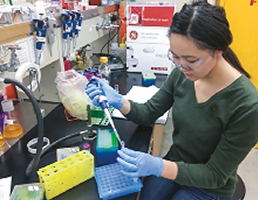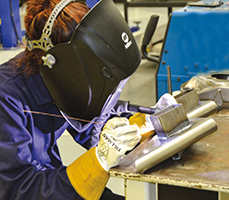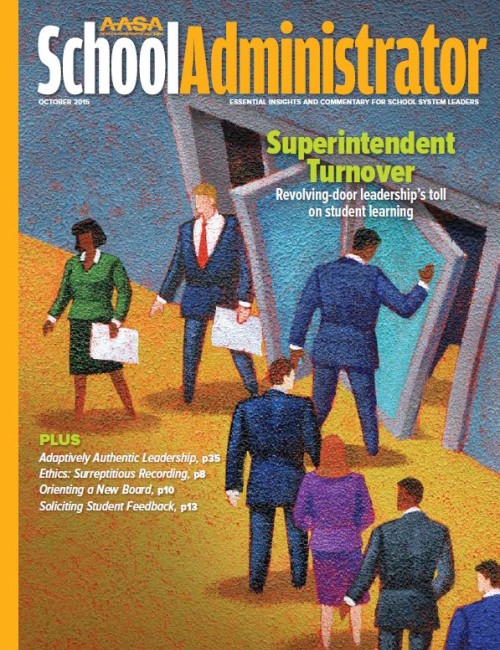August 2018: School Administrator

Career Pathways for Students
This issue focuses on preparing non-college-bound students for meaningful entry into the skilled labor force.
Advertisement
Additional Articles
-
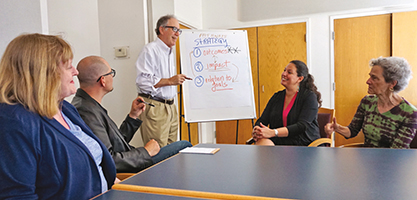 College is the Means, Career is the End
College is the Means, Career is the EndAn argument for requiring all students to develop the professional skills for the workplace
-
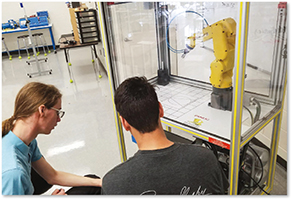 The New Reality of Career and Technical Education
The New Reality of Career and Technical EducationOvercoming tired stereotypes to promote business and industry programs in advanced fields
-
 The Overlapping Worlds of Work and Education
The Overlapping Worlds of Work and EducationHow savvy teachers are aligning today's classroom skill building with tomorrow's workplace expectations
-
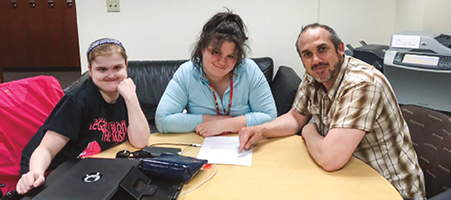 Transitioning Students With Disabilities
Transitioning Students With DisabilitiesGrassroots efforts spur moves into college and career for students with autism and intellectual challenges
-
 Public Appraisal
Public AppraisalThe extent to which school boards today are making public their superintendents’ job evaluations.
-
 A Hairy Backtrack
A Hairy BacktrackOur panel tackles the case of a principal’s job offer withdrawn from a primary grades teacher who refused to shave his long beard.
-
Board Committees That Work
A poorly designed structure of standing committees just might be the cause of micromanagement.
-
.png?sfvrsn=ab90bf45_7) Three Types of Mentors Support Our New Hires
Three Types of Mentors Support Our New HiresThe nurturing process extends well beyond induction week.
-
.png?sfvrsn=2c854cfb_9) Test-Driving the Future
Test-Driving the FutureWHAT DO YOU want to be when you grow up? It’s a question students hear from the time they set foot in a classroom until the day they graduate from college. When they are young, their answers are rarely the same year to year. The sky’s the limit.
-
 Filling in Skill Gaps With Youth Apprenticeships
Filling in Skill Gaps With Youth ApprenticeshipsAASA’s executive director has seen up close the merits of vocational programs for school-agers.
-
Defining What a Youth Apprenticeship Is
Youth apprenticeship is an evolving concept in the U.S. with no single, legal definition.
-
Experiencing Futures as Apprentices in Denver
As a high school freshman, Juan Carlos didn’t know if he would ever be ready for college. After all, no one in his family had ever gone to college, and he didn’t know what to expect.
-
Apprenticeships in Charleston Benefit Community Interests Too
Stephen Maddy was one of those high school students who knew where he wanted to start his career — the field of information technology.
-
The Allure of Europe's Youth Apprenticeship Connection
Policymakers in the U.S. have been fascinated by European youth apprenticeship systems for decades.
-
Illinois District Raises Profile of Workplace Prep
When Travis McGuire became superintendent five years ago of Hinckley-Big Rock Community Unit School District 429, a tiny, mostly middle-class district in northern Illinois, he decided early on to make career readiness a K-12 priority across the district.
-
A Launching Pad for Initial Careers
The Pathways to Prosperity Network is 6-year-old initiative to ensure many more youth complete high school, attain postsecondary credentials applicable to the labor market and launch careers while leaving open the prospect of further education.
-
 Managing Public Comments at Board Meetings
Managing Public Comments at Board MeetingsThe law does not guarantee a person’s right to speak at a board of education meeting, so how should you permit open feedback?
-
 Superintendent Blogging Should Be a Fixture
Superintendent Blogging Should Be a FixtureBlogging may not be the central force the author expected in schools today, but its interest among district leaders is taking a firm hold.
Staff
Editor's Note
Alternatives to College
School Administrator, August 2018
I would commend to your reading our cover story by Brent Parton of New America’s Center on Education and Skills about the significant strides being made in youth apprenticeships. His overview of the national movement is supplemented by contributions from Tom Boasberg and Gerrita Postlewait, superintendents in Denver and Charleston, S.C., respectively, on the apprenticeship programs in their schools.
We also invited a researcher in Germany, Ludger Deitmer, to address how the well-established corporate apprenticeship programs in his country are influencing the newly emerging programs in our country.
Finally, I’d call your attention to Paul Riede’s article on the modest moves by secondary schools to effectively transition students with intellectual disabilities into the workforce. With labor shortages emerging, it’s becoming a priority nationwide on both economic and moral grounds. Riede describes initiatives in Madison, Wis., and Westfield, Mass., and compiles several helpful resources for K-12 educators.
Voice: 703-875-0745
E-mail: jgoldman@aasa.org
Twitter: @JPGoldman
Advertisement
Advertisement

